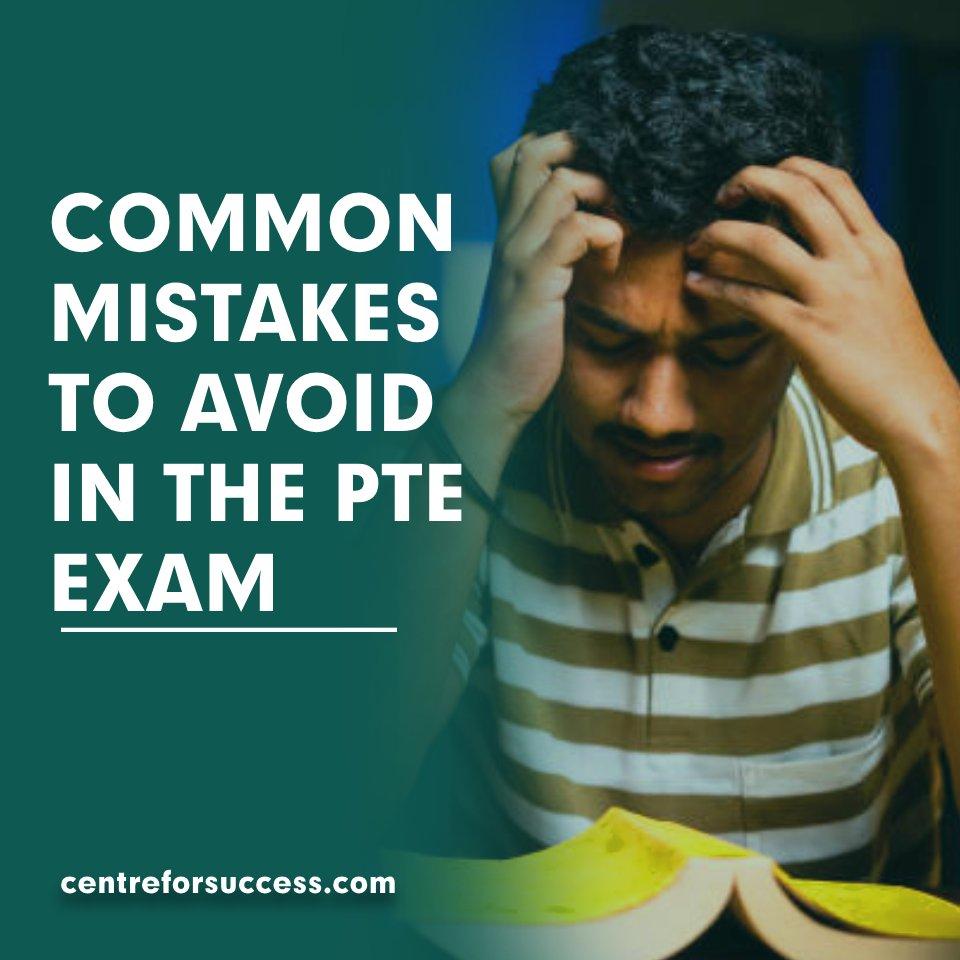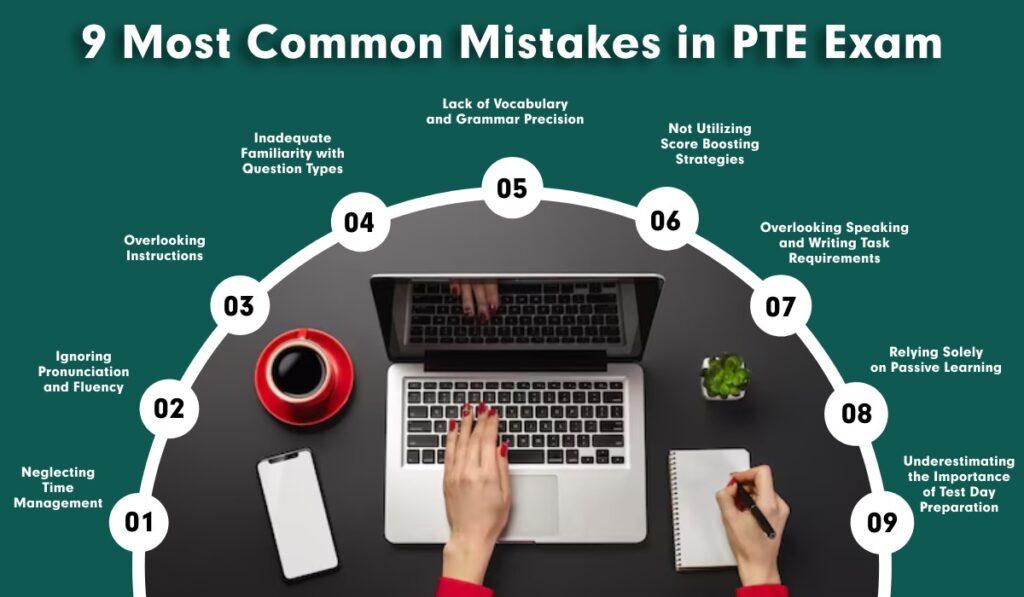Common Mistakes To Avoid in PTE Exam

Many candidates make common mistakes in the PTE exam and if they do not avoid them, it can significantly impact their scores.
These mistakes include poor time management, inadequate understanding of question types, and neglecting speaking and writing task requirements. Also, failing to prepare for test day logistics or relying solely on passive learning can further hinder performance.
These errors are widespread, affecting candidates’ ability to complete tasks effectively, communicate clearly, and stay calm under pressure.
So, By identifying and addressing these pitfalls, test-takers can improve their chances of achieving a higher score.
In this blog post, we will explore 9 common mistakes to avoid in the PTE exam which students frequently make and also learn how to avoid them.
Table of Contents
9 Most Common Mistakes in PTE Exam and Tips to Avoid Them

1. Neglecting Time Management
Time management is crucial in the PTE exam, where each section is timed. Many test-takers struggle to complete all tasks within the allocated time, leading to rushed answers and potential errors.
Tips to avoid:
- Start by familiarizing yourself with the format and timing of each section.
- During practice sessions, simulate exam conditions to improve your pace. Allocate specific time limits for each task and practice sticking to them.
- Prioritize easier questions to ensure you maximize your score within the time constraints.
Read more, the hardest part of the PTE exam.
2. Ignoring Pronunciation and Fluency
In the Speaking and Writing sections, pronunciation, fluency, and coherence are essential factors in the PTE exam. Mispronunciations or lack of fluency can impact your score, even if your content is accurate.
Tips to Avoid:
- Focus on improving your pronunciation by listening to native speakers and practicing commonly mispronounced words.
- Work on speaking fluently without pauses or hesitations.
- Use transition words like “however,” “moreover,” and “therefore” to connect ideas smoothly and enhance coherence.
- Regular practice with feedback from peers or tutors can help refine your speaking skills.
3. Overlooking Instructions
The PTE exam includes various question types, each with specific instructions. Misunderstanding or overlooking these instructions can lead to incorrect responses and a lower score.
Tips to avoid:
- Develop a habit of carefully reading and understanding each question’s instructions before answering.
- Pay attention to details such as word limits, required responses (e.g., summarize in one sentence), and task expectations (e.g., describe, compare, explain). Practice with sample questions to familiarize yourself with different formats and instructions, ensuring you are prepared for any variation in the exam.
4. Inadequate Familiarity with Question Types
The PTE exam encompasses a variety of question formats across different sections, such as multiple-choice, fill in the blanks, and essay writing. Failing to understand each question type can lead to incorrect answers and lower scores.
Tips to avoid:
- Prioritize familiarizing yourself with all question types well before the exam.
- Review sample questions and practice materials provided by Pearson and other reputable sources.
- Understand the specific requirements and strategies for tackling each question type effectively. This preparation will help you approach the exam with confidence and clarity.
5. Lack of Vocabulary and Grammar Precision
Effective communication in the PTE exam requires a strong command of vocabulary and grammar. Errors in grammar or limited vocabulary can affect your ability to convey ideas clearly and accurately.
Tips to avoid:
- Dedicate time to expanding your vocabulary and improving grammar skills.
- Read widely across various topics to expose yourself to diverse vocabulary.
- Practice using new words in sentences to ensure comprehension and retention. Additionally, review common grammatical rules and practice applying them in writing and speaking exercises. This approach will enhance your language proficiency and boost your confidence during the exam.
6. Not Utilizing Score-Boosting Strategies
Certain strategies can significantly enhance your performance in the PTE exam but are often overlooked by test-takers. These include using templates for essay writing, strategic guessing, and leveraging context clues in reading comprehension.
Tips to avoid:
- Explore and practice proven strategies recommended by experienced test-takers and instructors.
- Use essay templates to structure your responses effectively and save time. When unsure, employ strategic guessing techniques by eliminating obviously incorrect answers.
- In reading and listening tasks, pay attention to context clues and keywords to derive accurate answers efficiently.
- Familiarize yourself with these strategies through practice tests and guidance from tutors or study groups.
7. Overlooking Speaking and Writing Task Requirements
Tasks in the Speaking and Writing sections of the PTE exam often come with specific requirements that must be addressed to score well. Neglecting these requirements can lead to points deduction.
Tips to avoid:
- Before responding to speaking prompts or writing essays, carefully read and understand the task requirements.
- Ensure your responses fully address the prompt by structuring your answers according to the specified format (e.g., argumentative essay, oral summary).
- Practice with timed exercises to improve task comprehension and response accuracy.
8. Relying Solely on Passive Learning
Passive learning, such as reading or listening without active engagement, may not effectively prepare you for the interactive nature of the PTE exam. Simply absorbing information without practicing application can hinder performance.
Tips to avoid:
- Balance passive learning with active practice.
- Engage in speaking and writing exercises to apply acquired knowledge actively.
- Participate in mock tests or study groups to simulate exam conditions and receive constructive feedback.
- Active learning enhances retention and prepares you for real-time performance during the exam.
9. Underestimating the Importance of Test Day Preparation
Nervousness or lack of preparation on test day can negatively impact your performance in the PTE exam. Failure to manage stress and unfamiliarity with test logistics can lead to suboptimal outcomes.
Tips to avoid:
Plan for test day well in advance. Familiarize yourself with the test center location and transportation options.
- Ensure you have all necessary identification and materials prepared the night before.
- Practice relaxation techniques, such as deep breathing, to manage stress effectively.
- Arrive early on test day to allow time for check-in procedures and mental preparation.
- A calm and organized approach will contribute to a confident and focused performance during the exam.
Conclusion
In conclusion, avoiding common pitfalls in the PTE exam requires proactive preparation and a strategic approach. By focusing on time management, language proficiency, task comprehension, and effective test day strategies, you can significantly enhance your chances of success. Embrace these tips, practice diligently, and approach the exam with confidence to achieve your desired score.
FAQs
Poor time management is quite common among test-takers. Many struggle to complete tasks within the allotted time, which can lead to rushed answers and lower scores.
Pronunciation and fluency errors can significantly affect scores in the Speaking and Writing sections. Even with correct content, unclear pronunciation or lack of fluency may result in lower scores.
Understanding task requirements is crucial. Failure to fully address prompts or follow specific instructions can lead to point deductions and impact overall scores.
Effective test day preparation is essential. Nervousness or unfamiliarity with test logistics can disrupt performance. Being well-prepared and calm on test day contributes to a more focused and confident performance.
Passive learning alone may not adequately prepare candidates for the interactive nature of the PTE exam. Active practice, such as speaking and writing exercises, enhances comprehension and application of knowledge.





